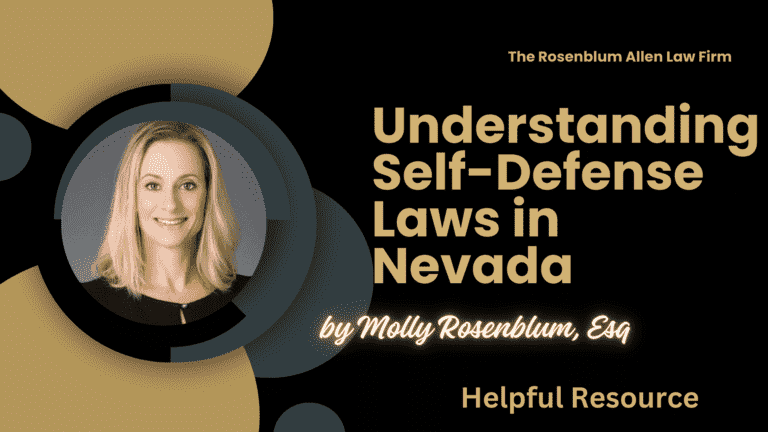
Definition of Self-Defense in Nevada
Self-defense in Nevada is defined as the right to prevent suffering force or violence through sufficient counteracting force or violence. This definition is crucial in understanding the legal boundaries within which individuals can act when they perceive themselves or others as in danger. It’s important to differentiate between self-defense and assault; self-defense is a legal justification for actions that might otherwise be considered assault. This distinction hinges on a legitimate and reasonable perception of imminent harm.
Criteria for Justifiable Self-Defense
The heart of self-defense law in Nevada lies in the criteria determining when self-defense is justifiable. For an action to be considered self-defense, the threat must be immediate and pose actual physical harm. The key factors include:- Immediacy: The threat must be urgent and happening at the moment.
- Reasonableness: The belief of imminent harm must be reasonable; it can’t be based on mere suspicion or fear.
- Proportionality: The response must be proportional to the threat. Excessive force beyond what is necessary to avert the danger may not qualify as self-defense.
Use of Deadly Force in Self-Defense
In Nevada, using deadly force in self-defense is subject to strict scrutiny. Deadly force is permissible only when the defender reasonably believes it is necessary to prevent:- Death or substantial bodily harm to themselves or another person or
- A forcible felony (like robbery or burglary).

Stand Your Ground Law in Nevada
Nevada’s Stand Your Ground law plays a pivotal role in self-defense cases. This principle asserts that a person has no duty to retreat before using force when they are legally present and not the initial aggressor.
In simpler terms, if you’re attacked in a place where you have a right to be, like your home, workplace, or a public area, you’re legally permitted to stand your ground. You can defend yourself. This law is crucial for defendants.
It protects their right to self-defense without the obligation to flee, even if retreat might be possible.
It’s a powerful affirmation of the right to defend oneself. But remember, using force must still be reasonable and proportionate to the threat faced.
Duty to Retreat
In contrast to the Stand Your Ground law, the ‘duty to retreat’ concept suggests that a person must try to avoid confrontation before using force.
However, in Nevada, the duty to retreat is generally not required if you’re in a place where you have the legal right to be. This means that, in most situations, you do not have to turn your back on a threat before defending yourself.
However, this does not give carte blanche to act violently without cause. The key is the reasonableness of the perception of the threat and the response to it.
Self-Defense and Home Intrusions (Castle Doctrine)
The Castle Doctrine is another cornerstone of self-defense law in Nevada. It offers specific protections for individuals defending themselves against intruders in their homes. Under this doctrine, the home is seen as a person’s castle.
There is a presumption that the homeowner acted reasonably if they used force against an intruder. This presumption is powerful because it shifts the burden of proof, often making it easier for defendants to justify their actions in the context of home defense.
However, it’s important to note that the force used must still be proportional to the perceived threat. Using deadly force against a minor, non-violent intrusion may not be justified.
In the following sections, we’ll explore the limitations and exceptions to these self-defense laws. We’ll also discuss the importance of intent and perception.
Finally, we’ll cover the legal process for defendants claiming self-defense. Each of these aspects is critical in painting a complete picture of how self-defense laws function in Nevada. This is particularly important from a defendant’s perspective.

Limitations and Exceptions to Self-Defense Laws
Nevada’s self-defense laws provide significant protections. But, they have limitations and exceptions. Defendants must understand these boundaries to avoid legal pitfalls. Self-defense cannot be claimed if the defendant was the initial aggressor or provoked the confrontation. Additionally, the use of force is not justified in response to verbal provocation alone. Another critical point is the proportionality of the reaction. Using excessive force when the threat could have been neutralized with less severe measures may not be considered justifiable. Understanding these limitations is critical to effectively navigating self-defense claims in Nevada.
Role of Intent and Perception in Self-Defense Cases
In self-defense cases, the defendant’s intent and perception play a central role. The law requires the defendant’s belief of imminent danger to be reasonable and genuine. This means that a defendant’s actions are judged based on what a reasonable person in the same situation would have believed. Their actions are not judged based solely on what the defendant personally perceived. For example, if a defendant misinterprets a situation and responds with unnecessary force, they might struggle to justify their actions as self-defense. These cases are subjective. A skilled defense attorney is critical. They articulate and defend the defendant’s perspective.
Evidence and Burden of Proof in Self-Defense Claims
When claiming self-defense in Nevada, the burden of proof and the type of evidence presented are vital considerations. Generally, the defendant must produce sufficient evidence to support their claim of self-defense. This evidence can include eyewitness testimonies, medical reports, and other relevant information. It corroborates the defendant’s account of the incident. The defendant has the burden of introducing evidence of self-defense. However, the prosecution must still prove beyond a reasonable doubt that the defendant’s actions were not justified in self-defense. The presentation and quality of evidence can significantly influence the outcome of a self-defense claim.
Legal Process for Defendants Claiming Self-Defense
For defendants claiming self-defense in Nevada, understanding the legal process is critical. The process typically begins with the defendant’s arrest and charge for an offense. Self-defense is claimed as a defense. Following this, pre-trial procedures include evidence gathering, witness interviews, and possible plea negotiations. If the case goes to trial, the reason will present evidence supporting the self-defense claim. The prosecution will attempt to counter this claim. Throughout this process, a competent defense attorney is invaluable. They navigate the complexities of the legal system, ensure the defendant’s rights are protected, and present a compelling case for self-defense.
Why You Have Not Hired a Felony Defense Attorney Yet
Watch this short video to take the next big step toward defending your rights against a felony charge.

Breaking It All Down for You
In conclusion, understanding Nevada’s self-defense laws from a defendant’s perspective is essential for anyone facing legal challenges. These laws protect individuals who legitimately defend themselves. They have clear boundaries to prevent misuse. Understanding the nuances of these laws can make a significant difference in the outcome of a self-defense case. This includes the Stand Your Ground principle and the intricacies of presenting evidence.

Frequently Asked Questions
What are the key factors in determining the validity of a self-defense claim in Nevada?
The validity of a self-defense claim depends on the immediacy and severity of the threat, the proportionality of the response, and the defendant’s reasonable belief of imminent danger.
How can a defendant’s criminal history impact their self-defense claim?
A defendant’s criminal history or prior violence can cast doubt on the reasonableness of their actions and negatively impact the credibility of their self-defense claim.
What are the consequences of using excessive force in self-defense?
Using disproportionate force in self-defense can lead to criminal charges and civil liability, as the response must be reasonable and proportionate to the perceived threat.
How does Nevada’s Castle Doctrine apply to self-defense cases?
Nevada’s Castle Doctrine presumes that force used against an intruder in one’s home is justified, but this presumption can be rebutted if the defendant’s actions were unreasonable or excessive.
What are the legal implications of claiming self-defense in domestic violence situations?
Self-defense claims in domestic violence cases are subject to the same legal standards, but the context of the relationship and any history of abuse will be closely scrutinized.
What should a defendant do immediately after a self-defense incident?
After a self-defense incident, the defendant should ensure their safety, contact law enforcement, provide a brief account, seek legal counsel, and preserve any relevant evidence.
How can a defendant effectively communicate their perspective in a self-defense case?
Defendants should provide a clear, consistent account of events, emphasize their genuine belief of imminent danger, and highlight the reasonableness of their response based on the circumstances.
What resources are available in Nevada to help understand self-defense laws?
Legal clinics, community programs, and some law firms offer educational materials, workshops, and consultations to help individuals understand their rights and responsibilities regarding self-defense laws.

Glossary
Self-Defense: A legal defense that justifies using force to protect oneself or others from immediate physical harm.
Deadly Force: Force that is likely to cause death or serious bodily harm.
Reasonable Belief: A standard in law where a person’s belief or action is considered reasonable if it aligns with what an average person would believe or do under similar circumstances.
Proportionality: The principle that the level of force used in self-defense should be appropriate and not excessive compared to the threat faced.
Stand Your Ground Law: A legal doctrine in some jurisdictions that allows individuals to use force in self-defense without the duty to retreat when faced with a perceived threat.
Duty to Retreat: The legal obligation in some jurisdictions to attempt to escape or avoid conflict before resorting to force in self-defense.
Castle Doctrine: A legal doctrine that provides individuals with certain protections and immunities when defending themselves against intruders in their homes.
Immediacy: The requirement in self-defense situations that the threat must be urgent and happening at the moment.
Forcible Felony: A serious felony that involves violence or the threat of violence, such as robbery or burglary.
Mutual Combat: A situation where two or more parties willingly engage in a fight or physical conflict.
Domestic Violence: A pattern of abusive behavior in any relationship that one partner uses to gain or maintain control over another intimate partner.
Legal Process: The series of steps in the criminal justice system, from arrest to trial, that a defendant goes through when charged with a crime.
Burden of Proof: The obligation to prove one’s assertion or claim in a legal proceeding.
Criminal History: A record of a person’s previous criminal convictions and offenses.
Additional Resources for You

Criminal Defense Attorneys: Expert guidance and defense strategies for a broad spectrum of criminal charges. Explore more.
Las Vegas DUI Lawyer: Specialized legal assistance for DUI charges, offering strategies for defense and information on DUI laws in Las Vegas. Learn about DUI defense.
Domestic Violence Lawyer Las Vegas: Legal support and defense tactics for those accused of domestic violence, highlighting the complexities of such cases. Discover your options.
Drug Possession Lawyer: Guidance on facing drug possession charges, including potential defenses and the impact of Nevada’s drug laws. Understand drug charge defenses.
Sex Crimes Attorney: Specialized defense strategies for those accused of sex crimes, emphasizing the serious consequences and legal options. Explore sex crime defenses.
CPS Defense Attorney: Assistance for cases involving child protective services, including allegations of child abuse and neglect. Learn about CPS defense.
Misdemeanor Lawyer: Legal advice and defense for misdemeanor charges, highlighting the potential for significant penalties even for lesser offenses. Review misdemeanor defenses.
Las Vegas Warrant Defense Attorney: Guidance on resolving outstanding warrants and the steps to take to address these legal issues. Learn about warrant defense.
Las Vegas Probation Violation Attorney: Information on handling probation violations, including potential consequences and defense strategies. Explore probation violation defense.
Theft Crime Defense Lawyer: Defense strategies for those accused of theft, detailing the various types of theft charges and their implications. Understand theft defenses.
Kidnapping Lawyers: Legal assistance for kidnapping charges, emphasizing defense strategies and the gravity of such accusations. Learn about kidnapping defense.
Firearms Lawyer Las Vegas: Expertise on defending against firearms charges and understanding Nevada’s gun laws. Discover firearms defense strategies.
Through these resources, Molly Rosenblum, Esq. aims to empower you with knowledge and support, ensuring that you have access to legal information that could be critical during your time of need.

Offsite Resources You May Find Helpful
Here are seven offsite resources related to self-defense laws and legal assistance that you might find useful:
American Bar Association (ABA): A prominent organization providing resources and guidance on various legal topics, including self-defense laws. Visit ABA
- FindLaw: A useful resource for finding legal information, articles, and local attorneys experienced in self-defense cases. Access FindLaw
National Association of Criminal Defense Lawyers (NACDL): Provides resources and support for criminal defense attorneys and individuals seeking information about criminal defense. Visit NACDL
Justia: Offers a vast library of legal information, including case law and summaries of state laws relevant to self-defense. Check out Justia
LawHelp.org: Helps individuals find free legal aid programs in their community and provides information about their legal rights. Go to LawHelp.org
NOLO: A long-standing resource for legal articles, DIY legal books, and software, with a section dedicated to criminal law and self-defense. Explore NOLO
These resources offer a wealth of information and can be incredibly helpful for anyone looking to understand more about self-defense laws or seeking legal assistance.

A Special Message From Our Lead Attorney
Why You Might Need a Lawyer

Molly Rosenblum, Esq
Dear Reader,
Thank you so much for taking the time to explore our theft law resources. We hope you found the information insightful and helpful in understanding the legal landscape surrounding these issues.
We are here to assist you if you have any questions or need personalized legal advice. I invite you to schedule a free consultation with our team to discuss your specific situation and explore how we can help you navigate any legal challenges you might be facing.
Please call us at (702) 433-2889 to schedule your appointment. Our dedicated team at The Rosenblum Allen Law Firm is committed to providing you the support and guidance you need.
I am looking forward to connecting with you soon.
Best regards,
Molly Rosenblum, Esq.





